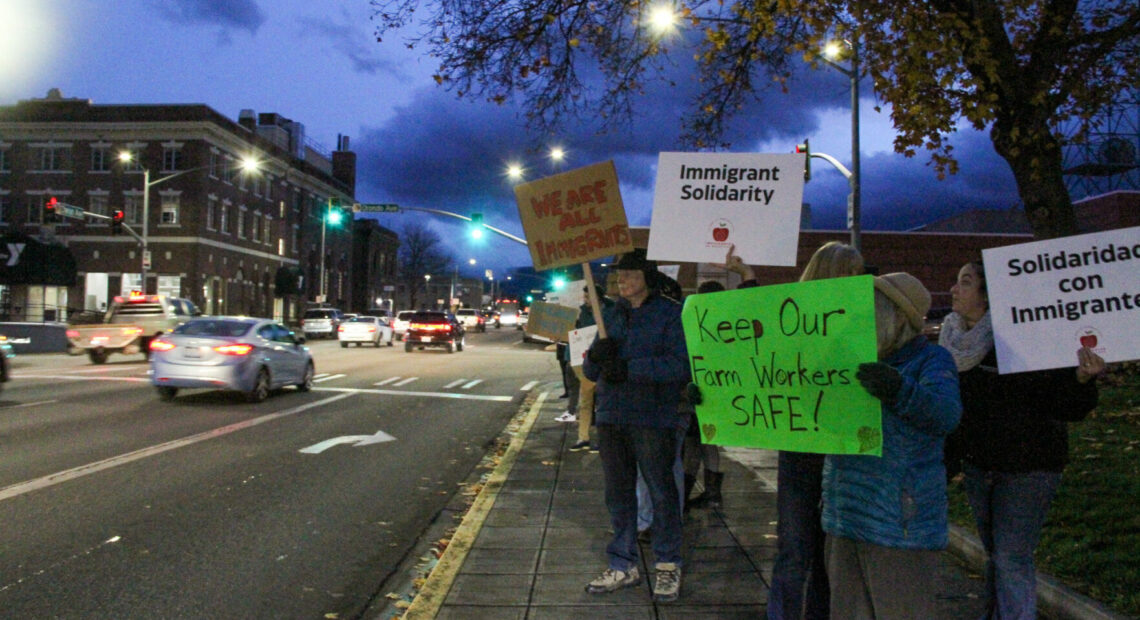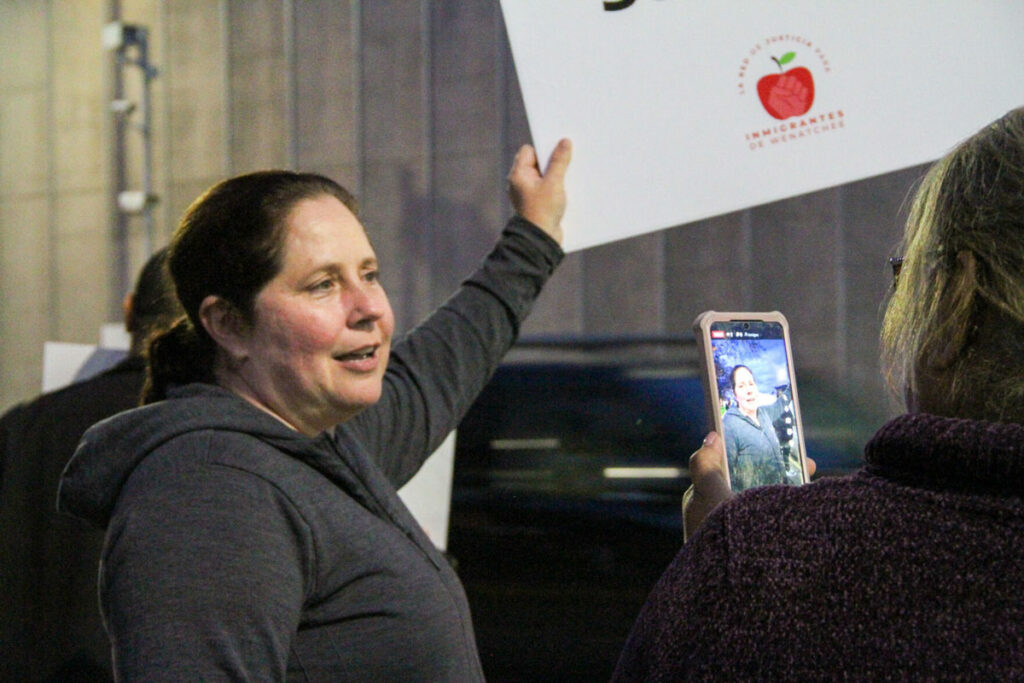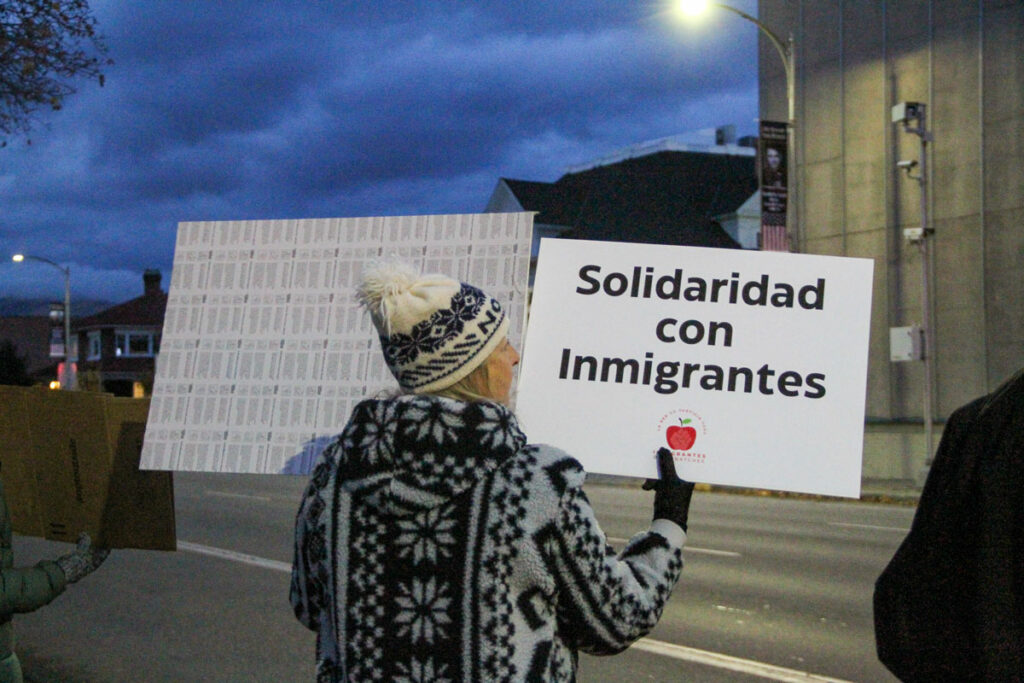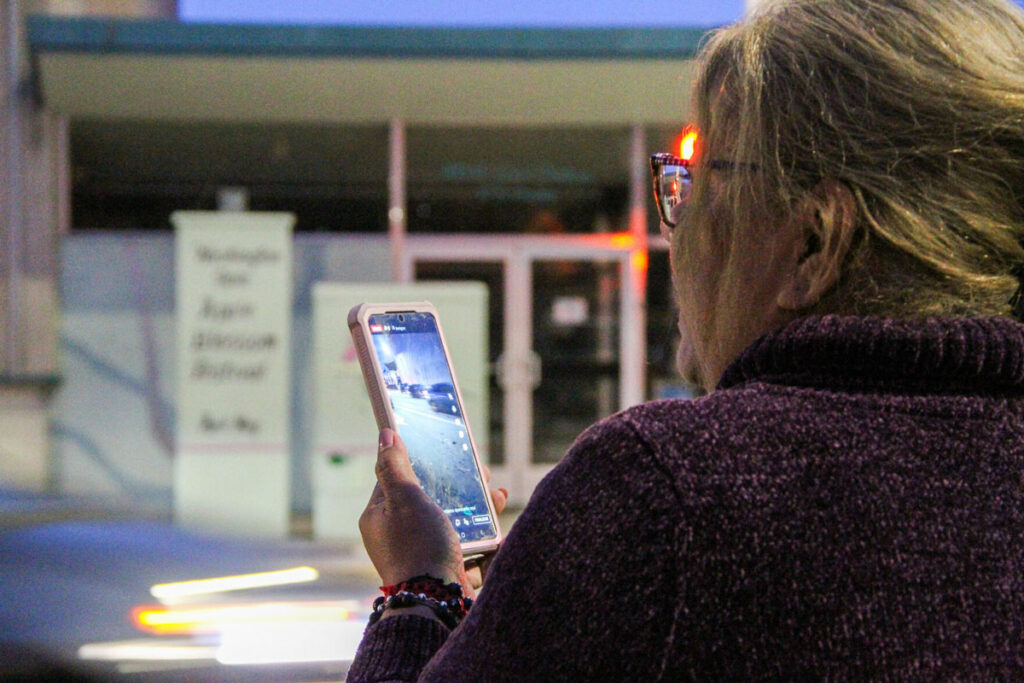
Community rallies for immigrant justice amid rising tensions and calls for unity
Listen
(Runtime 1:04)
Read
WENATCHEE — Drivers honked in solidarity as they passed a gathering of people outside Memorial Park on Nov. 13. The people on the sidewalk were calling for unity and justice amid ongoing debates over immigration policies.
The event, a “Silent Vigil,” was organized by Wenatchee for Immigrant Justice, a volunteer group that began during the pandemic. The organization initially focused on rapid response and court accompaniment to support immigrants facing potential detention. Now, it’s expanding its efforts to foster a sense of safety and belonging for immigrant communities in North Central Washington.

“In light of the election, we wanted our immigrant families and neighbors to know that not everyone buys into the harsh rhetoric,” said Rachael Howard Pashkowski, a member of Wenatchee for Immigrant Justice. “Immigrants are valuable and play a wonderful part of our community, especially here in Wenatchee.”
The recent election has left many immigrants feeling uncertain about their futures. Washington state is home to more than 220,000 undocumented immigrant workers according to a Pew Study.
Many people at the vigil were retired teachers and educators in the Wenatchee and Eastmont school districts. Some people said they were there for their past students who were part of Deferred Action for Childhood Arrivals, also known as DACA.

“I am here for my students. I had many students who were in DACA. Protect the children and be kind,” said Rhonda Stradling Lara, a retired bilingual teacher.
DACA protects eligible undocumented immigrants who were brought to the U.S. as children from deportation, allowing them to work and study legally. However, its future remains uncertain amid ongoing political and legal challenges. Washington is home to more than 16,000 DACA recipients.
Juan Rodriguez, who came to the U.S. as a child, attended the vigil to show support for his community.
“If we look at our school districts, over half the population is Latino,” said Rodriguez. “Our undocumented community is critical to the success of our agriculture-focused economy.”
Nationally, the majority of agricultural workers are born in another country, and more than 70% of those workers identify as Hispanic or Latino, according to the National Center for Farmworker Health.
Agriculture is a cornerstone of the local and national economy in Washington. According to the Washington State Department of Agriculture, the state’s production value is over $12.8 billion.
Rodriguez also noted the financial challenges faced by many immigrant families. He said he thinks this is a factor why many Latinos voted more conservatively in this election. “People don’t feel it in their pockets when they go through the grocery store or pump gas, “said Rodriguez.
In the 2024 election, Donald Trump made significant gains among Latino voters, winning 43% of their votes—a record for a Republican candidate. Vice President Kamala Harris, however, retained the majority at 55%, according to an AP poll.
Trump’s success in winning the election marked a major shift from 2016, when he only captured 28% of the Latino vote.
The gathering also brought attention to divisions within the Latino community itself.
“I think that’s also something that we need to acknowledge as a Latino community. You hear at times when someone gets together with a more fair skinned colored person that you hear the phrases. Que bien vas a mejorar la raza. Meaning you are going to make the race better because you are getting together with a lighter skinned person. There is still a lot of racial division within our own Latino community,” said Rodriguez.
The group encouraged attendees to write messages showcasing the cultural and economic contributions immigrants bring to the region, emphasizing their value beyond just labor. The vigil served as a moment of reflection and solidarity for those who participated.

Gabriela Delgado, who conducts outreach for Wenatchee for Immigrant Justice within the Latino and Hispanic community, stood with her group sharing the gathering online. She recorded people holding signs that read “Solidaridad con inmigrantes” — Spanish for “Solidarity with Immigrants.” Delgado connected with individuals locally, across the state, and outside the country, aiming to spread the message that immigrants have allies and support within the community.
“We are human; we are not just statistics,” Delgado said. “We’re here to show people that they’re not alone. Many are just getting off work from apple packing or other jobs, and we wanted them to hear and see that we’re with them.”
Reneé Diaz may be contacted at Renee.diaz@wenatcheeworld.com. Collaborative reporting by The Wenatchee World, NWPB and Murrow College of Communication Newsroom Fellowship.
















